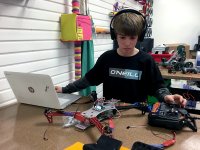Going Gradeless: Student Self-Assessment in PBL
By replacing student grades with an end-of-quarter conference, you can change that persistent question of “Will I be graded on this?” to “What can I do better?”
I like reading professional material. I would posit that most teachers do. Professional reading (OK, all reading, really) allows our thoughts to constantly shift, transform, and travel to currently uncharted mental territory. If we are lucky, we encounter a watershed idea or concept that shatters our thoughts and understanding to such an extent that it requires a complete rebuilding of our philosophy.
I was provided such a moment when I read Mark Barnes’ Role Reversal: Achieving Uncommonly Excellent Results in a Student-Centered Classroom in the spring of 2015. Mr. Barnes advocated using narrative feedback to enter a feedback loop that would culminate in mastery of specific learning targets within the context of a larger project. I was immediately transfixed by this idea. My mind was figuratively blown when Mr. Barnes mentioned that he did this without ever assigning a formal grade until the end of the grading period, at which time he and the student conferenced and agreed on a grade based on feedback. I stewed on this for a roughly a year until I decided, for the good of my students, that I had to do it. I was going to go gradeless. My question became: "How can I implement this in my sixth-grade PBL classroom?"
My Goal
It was my intention to simultaneously promote mastery learning as well as increase students' ability to metacognitively assess their work against a given set of standards. Here's how I would accomplish this:
- Remove grades from the daily equation.
- Have students reach learning mastery using narrative feedback loops (Mark Barnes’ SE2R model).
- Students would self-assess their work in a 1:1 conference with the teacher at the end of the quarter, at which time student and teacher would agree upon a final grade.
My Plan
I knew that I needed to maintain accountability to various stakeholders in this process -- the students, their families, and the administration. After a great deal of thought, I came up with the skeleton of a plan that looked like this:
- The results of the assessments would be placed in our online grading system for parent viewing. However, the results would not calculate toward a final grade.
- The assessment scores would be used as data points in our end-of-quarter meeting.
- If I agreed with the student's response, I would put that grade into the grading system.
- If I didn't agree, I would interject my viewpoint based on the feedback that I had given, as well as on the results of standards-based assessments. I would then ask the student to reevaluate his or her response to encourage deeper metacognitive thinking.
The Results
I've only been officially gradeless for less than a quarter, but the results have been astounding. As soon as the students came to understand and be comfortable with the process, my inbox has been continuously flooded with their emails asking me, "What can I do better?" The conversation has completely shifted from getting a grade to learning. It's been amazing! Similarly, when I communicated this process to students' families, I thought I would be walking into the lion's den. Of the 80 families who received that communication, I heard back from only three -- and all three said, "Sounds awesome." All in all, it's been a wonderful experience, and a true illustration of the power that the written word can have over all of us. (Thank you, Mark Barnes!)
I would love to hear your feedback, thoughts, or other ideas in the comments section below.
